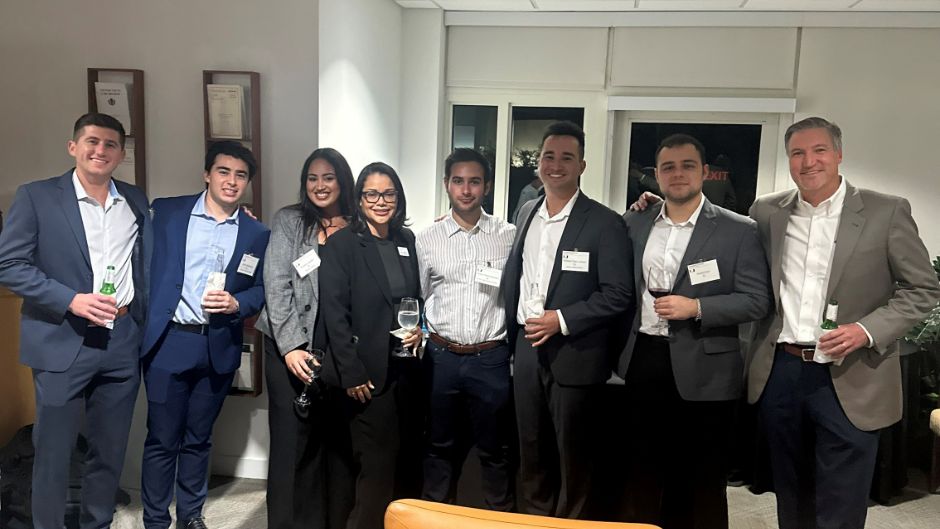Third-party litigation funding occurs when a third party, often a hedge fund or other financial entity, invests in a lawsuit, typically a plaintiff's case, in exchange for a portion of any settlement or judgment. The practice presents new opportunities and benefits for law firms, claimants, and nonlawyer investors while raising important considerations for the legal profession and the public. The law school offers business law as a speciality area of study.
The University of Miami School of Law's Business Law Review recently hosted its annual fireside chat, fostering a stimulating discussion on the implications of Third-Party Litigation Funding within the legal sector and the potential consequences of allowing nonlawyer investments in litigation. The event featured three distinguished panelists and legal experts—Barry Kamar, Jan L. Jacobowitz, and David Levine.
Kamar is a partner at King & Spalding and a former litigation finance broker. His involvement in the litigation funding industry includes developing close relationships with capital sources and working on various deals to secure funding for meritorious litigation matters. Jacobowitz is the founder of Legal Ethics Advisor and previously served as the director of the Professional Responsibility and Ethics Program at the School of Law. She has been involved in key cases related to litigation finance, including those concerning attorney fees, conflicts of interest, and the unauthorized practice of law. Levine is a founding partner of Sanchez Fischer Levine, LLP, and the former co-chair of the International Ethics Committee of the American Bar Association's Section of International Law. He has frequently spoken on ABA panels nationwide, addressing emerging legal and ethical issues facing attorneys, including litigation funding.
The event moderator, Tyler Lowman, senior articles editor of the Business Law Review, opened the discussion by inviting the panelists to break down the litigation finance framework and share insights into its benefits and potential risks they have encountered or seen in practice. One notable benefit highlighted was litigation funding as an alternative to loans. Litigation funding is nonrecourse and, thus, a highly attractive means of obtaining capital for law firms without relying on credit. Additional advantages discussed included enhancing firm value and significant flexibility in structuring funding agreements.
The panelists provided a comprehensive overview of securing litigation funding, emphasizing the use of NDAs between the parties, the extensive due diligence conducted, and the typical structure of a term sheet between the funder and lawyer or claimant. The discussion on due diligence led to a particularly interesting conversation: the impact of litigation funding on case selection. Litigation funders conduct extensive research of a case's merits and potential collection prospects to ensure they invest in the case with the most favorable investment outcome. Interestingly, the panelists noted that this level of scrutiny can influence an attorney's decision to take on a case. If a reputable funder, after due diligence, declines to invest in a particular litigation, an attorney may reconsider pursuing the matter.
The panelists also spoke on establishing boundaries to ensure attorneys maintain their professional independence, as required by the ABA Rules of Professional Conduct, while balancing their obligations to the client and the funder. Attorney-client privilege was a focal point of discussion, particularly regarding funders' due diligence needs. The ethical implications of nonlawyer involvement in litigation funding further sparked a dynamic exchange on Alternative Business Structures. The panelists examined Arizona and Utah's experimentation with nonlawyer equity ownership of law firms through ABS models, discussing how these developments intersect with and expand upon traditional litigation funding mechanisms. They provided a thought-provoking analysis of how law students and legal professionals might anticipate continued innovation and regulatory shifts in the legal industry.
The discussion concluded with an engaging Q&A session, where students from all class years posed insightful questions about the ethical dimensions of litigation funding and its broader implications across different industries. The exchange underscored the significance of events like this in fostering critical dialogue on legal innovation and shaping the future landscape of the profession.
Following the fireside chat, attendees—including Business Law Review alumni, students, faculty, and administration—gathered for a networking reception. The reception fostered further discussion, allowing participants to connect with professionals in the field and explore the expansive implications of litigation funding on the evolving legal landscape.
Read more about Miami Law's law reviews and journals.

